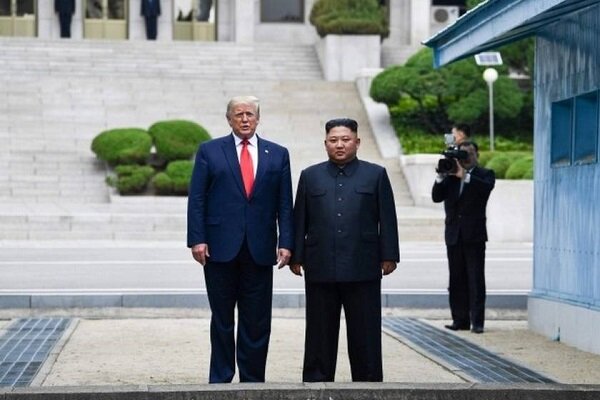The messages hidden in a meeting

The two sides had last met in late February; after that, the negotiations did not go any further and were practically on hold.
Evidently, Donald Trump is the first U.S. president to step into North Korea; he believes that going across the borders that divide North and South Korea is a cause for pride.
After the meeting, Trump announced that he had invited North Korean leader Kim Jong Un to Washington and they had agreed to restart negotiations, but the sanctions on North Korea were still in place!
Kim Jong Un also said that Trump’s coming to the North Korea was a historical and important moment. If Kim Jong Un travels to U.S. as well, he will be the first North Korean president to visit U.S.
This meeting and Trump’s strategy in dealing with one of the most important issues of U.S. foreign policy, tells us many important things which we will briefly discuss here:
First, as many international analysts believe, Trump’s behavior, as a politician, has a number of features that makes him different from most of other politicians.
Experts believe Trump is a politician who majorly behaves based on advertising techniques; with using these techniques, he plays both his enemies and political rivals.
As he himself has repeatedly said in his electoral campaigns, he is an actor who tries to take the lead in all his interactions and don’t let others to design the rules of games he is playing. This strategy is completely evident in the way he interacted with rich Arab sheikhs and now with boasting about his seemingly bold entrance into North Korea.
Therefore, we can conclude that Trump’s actions are not based on any specific set of rules; he has no clear stand in politics; rather, he mainly designs he actions based on an advertising and commercial model. This is completely evident in the way he has been dealing with North Korea.
Trump wants to pretend that he has a specific doctrine in his international policy; he has even tried to come up with “Trumpism” as a new doctrine like “Jacksonism” or “Jefersonism”, but it is already clear to everybody, including the republicans, that Trump’s international policy is not based on any specific strategy or theory; rather it is merely a show that is rooted in his specific character.
The second point to discuss here is the important role of “foreign policy” in U.S. next presidential elections in 2020.
Based on the latest polls taken by Quinnipiac University, foreign policy is among the most crucial parameters that have severely decreased Trump’s popularity, especially in grey, key states such as Pennsylvania, Wisconsin and Michigan, Ohio and Florida.
it is expected of democrats to mainly focus on Trump’s foreign policy as one of his weaknesses during the next presidential elections; therefore, Trump is now thinking about “changing the current trend” of his foreign policy; in other words, he mainly wants to create the feeling in American citizens that he is making changes in his foreign policy.
In conclusion, we cannot simply figure out Trump’s strategies and judge the limits and parameters of his behavior; because his behaviors are not consistent, they are based on “fleeting tactics” and “momentary emotions”, and we have all witnessed numerous examples of this behaviors since he took the office in 2017.
The last point to discuss is the general idea behind the meeting between U.S. and North Korea’s leaders. Obviously, in dealing with Pyongyang, Trump is simultaneously using both “threats” and “negotiations”, this is the same strategy that he is trying to adopt toward Iran as well.
This paradox is not based on some careful foreign policy plans that U.S. administration has devised; rather, it is the result of Trump’s uncertainty about the right way to use U.S. diplomatic and strategic powers. This is a very serious problem and cannot be resolved anytime soon, even with removing people like John Bolton and Mike Pompeo from the cabinet.
Even when Rex W. Tillerson was the Secretary of State and H. R. McMaster was the National Security Advisor, Trump suffered from this chronic uncertainty; therefore Trump will continue to have this paradoxical, dubious and dual behavior until the last day he is in office, whether it would be 2020 or 20224.
Source: TehranTimes
















